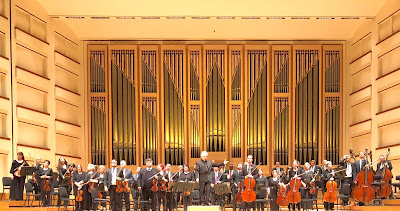I’m glad I got to hear that before I die.
That’s what I told Pat, my wife, immediately as we stood up to join a standing ovation for the Charlotte Symphony last night.
Pat makes all the arrangements, you see, for our concerts and outings and travels and every other adventure we’ve had in the last forty years.
So I thanked her for making it possible for me to hear Antonín Dvořák’s New World Symphony, in live performance, before I pass into eternity.
And I must say that the Charlotte Symphony’s treatment of it, under the guest conducting hand of Ilyich Rivas, was masterful—very tender and very strong.
The oboe adagio in the slow second movement fully met my expectations, after having listened intently to the piece probably thirty or forty times as offered by the New York Philharmonic on youtube.
And those trombones in the final cadence did not fail to summon a tear from my eyes, as their vibrantly forthright sounding forth renewed my confidence in human excellence.
During the intermission I read in the program notes about Dvořák’s composition of that symphony—his No. 9—and its premiere performance in New York, in 1893.
The Czech composer had been recruited to our (American) National Conservatory of Music in 1892. His mission was to import a little of that Old World excellence to our New World.
And goshdarn! did he do it!
His New World Symphony ranks right up there as some of the greatest symphonic music ever to be composed on this side of the Atlantic. It’s right up there with Copland’s Appalachian Spring, Grofé’s Grand Canyon Suite and Gershwin’s Rhapsody in Blue.
If you ever have an opportunity to stand in Prague’s Old Town Square and behold Ladislav Šaloun’s statue of Jan Hus, you may catch a glimpse of the passion that must have driven Dvořák’s resolve to compose such an orchestral masterpiece.
I’m glad I lived to see it.
Since the music was composed in New York City, I will provide here this link to the New York Philharmonic performance of it:
In other news of my yesterday. . .
Earlier in the day I had finished reading Andrew Marantz’s excellent book analysis of contemporary alt-right online misadventures:
And I will offer as a closing thought, a quote from Andrew’s account of what he uncovered in the world of ultra right-wing fanaticism. Toward the end of his research project, Marantz arrived at an eye-opening discovery about the so-called media “gatekeepers” in our mad world of media, formerly on the airwaves ~~~ now online.
Because we do indeed live in a “New World”. . . a world that is continuously renewing itself, sometimes in good ways, sometimes in bad ways.
In the quote below, Andrew Marantz is referring to the “gatekeepers” of our former (20th-century) times. They are primarily the major broadcast networks and news publications that came to dominate our public culture in the postwar 20th-century; but they have in this 21st-century been overtaken by the new superpowers of online media.
You know what I’m talkin’ about. Their initials are FaceGooAmazTwittetc. One particular CEO of that cartel, the honorable Mr. Z, was recently put on the Congressional hotplate for public inspection.
As Andrew Marantz, the New Yorker writer, neared the end of his alt-right research opus, Antisocial,
He exposes a raw nerve in this, our brave new cyberworld, a world in which the outmoded moguls of 20th-century media have been eclipsed by the new titans of 21st-century webdom.
Like it or not, these denizens of the updated corporate Deep must rise to the public surface to accept some responsibility for oversight in the polarizing electronic net that we’ve cornered ourselves into.
Here’s part of what Mr. Marantz has to say about it:
And yet this is the world we live in. For too long, the gatekeepers who ran the most powerful information-spreading systems in human history were able to pretend that they weren’t gatekeepers at all. Information wants to be free; besides, people who take offense should blame the author, not the messenger; anyway, the ultimate responsibility lies with each consumer. Now, instead of imagining that we occupy a postgatekeeper utopia, it might make more sense—in the short term, at least—to demand better, more thoughtful gatekeepers.
It’s a brave new world out there, boobie. Somebody’s gotta be brave, if not them, then who?
Us? But, but, as Pogo once said, long ago in the old media world: we have seen the enemy . . . and he is us!














